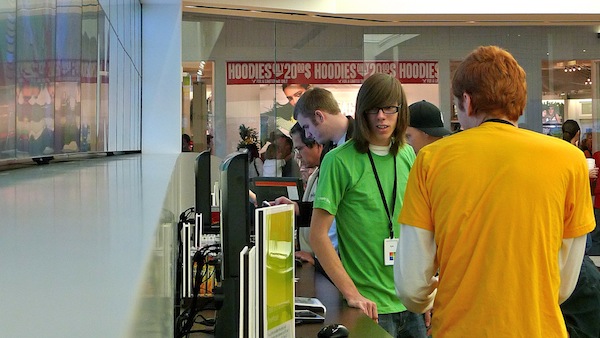Should Microsoft franchise its retail stores?
If you believe Mid-March job postings, Microsoft is preparing to launch two new retail stores, in Denver and San Diego, bringing the count to four. That's not exactly rapid expansion, given two other stores opened in October -- Mission Viejo, Calif. and Scottsdale, Arizona. Microsoft has to move more aggressively into retail, if it's going to rebuild its brand image and establish an appealing digital lifestyle for the twenty-tens.
The company has an image problem that smart marketing and savvy retailing can repair. Yesterday, at MSNBC, Bill Briggs called Apple "fresh" and Microsoft "frumpy". The nut graph: "Microsoft, to some, appears a tad flabby in the middle -- a Chrysler Town & Country driver with a 9 p.m. bedtime. Apple, in some eyes, looks sleeker and younger -- a hipster in ragtop Beemer packed with chic friends sporting mobile toys."
Microsoft is getting the marketing part down. Bing and Windows 7 TV commercials are remarkably good (I love the French one, by the way). But marketing alone won't fix Microsoft's image problems. All successful brands sell a lifestyle, something companies like Apple, IKEA, Pepsico and even Walmart excel at. Retailing is the other part of the solution. Like Apple and Sony, Microsoft needs retail stores to hawk its products, improve customer satisfaction and sell a lifestyle. That's not going to happen with a few stores opening every year.
So why not franchise? Apple wouldn't do it. But franchising is highly congruous with Microsoft's long-loving channel ways. Rather than compete with retailers and resellers, Microsoft should make some of them part of the family. The company already has robust channel programs in place. Surely Microsoft could create from that foundation a franchise program faster than the time needed to build 20 or 30 new stores on its own.
I'm not talking authorized dealers, but real Microsoft Stores. Malls are filled with, say, AT&T or T-Mobile stores and their authorized dealers. They confuse consumers, and the approach is not a clear, clean way to build a lifestyle brand. Like other franchises, the stores would conform to design and operational standards set by the franchiser. Like McDonalds franchises, these Microsoft Stores would be indistinguishable from company-owned shops. Although a smart Microsoft would give franchisees some pricing latitude and perhaps opportunity to offer additional services.

Timing is excellent:
- There is plenty of available retail space -- even in shopping malls -- presumably for more reasonable prices than, say, two years ago.
- The Obama Administration is looking for ways to stimulate small business growth; franchising could be good PR as much as good retailing.
- Microsoft's financing arm could help worthy franchise applicants to secure financing in these tough-borrowing times, which, again, would be good PR.
Franchises would offer many benefits to Microsoft:
1) They would generate additional revenue, in the upfront franchise cost and any cut Microsoft might choose to take from the stores.
2) Microsoft could rapidly build up its retail presence, assuming there are businesses looking to buy the franchises (Surely there would be).
3) The company could more rapidly learn what does and what does not work in retailing and apply those lessons to its operations. Microsoft CEO Steve Ballmer claims that running Yahoo search provides scale for improving search queries. The same scale principle can be applied to improving the retail experience.
Microsoft could (and should) continue building its own stores even as franchisees open others. My advice: Set a target for what number of stores would have enough geographic reach, then end the franchising program. Ideally, Microsoft should want more company stores than franchises. They are but a means to end -- scaling the retail operation faster. Microsoft could inform potential franchisees from the start that the program would eventually end. Those folks buying in early could get something not available later on. That would be incentive for them to participate.
The other option is for Microsoft to build retail stores faster. But at present pace, Microsoft isn't moving fast enough.
